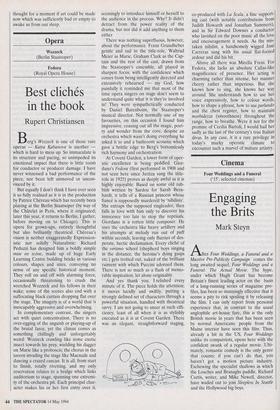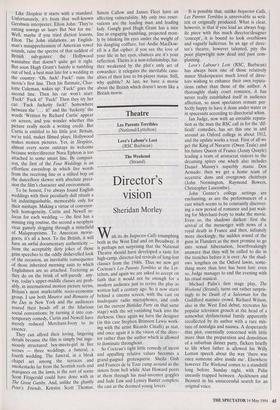Cinema
Engaging the Brits
Mark Steyn
After Four Weddings, a Funeral and a Massive Pre-Publicity Campaign comes the long awaited sequel, Four Weddings and a Funeral: The Actual Movie. The hype, under which Hugh Grant has become Britain's finest leading actor on the basis of a long-running series of magazine pro- files, has been so stunningly effective that it seems a pity to risk spoiling it by releasing the film. I can only report from personal experience that, in contrast to the usual anglophile art-house fare, this is the only British movie in years that has been seen by normal Americans: people from the Maine interior have seen this film. Thus, already a hit in the US, Four Weddings unlike its compatriots, opens here with the confident swank of a regular movie. Ulti- mately, romantic comedy is the only genre that counts; if you can't do that, you haven't got a motion picture industry. Eschewing the specialist shallows in which the Loaches and Branaghs paddle, Richard Curtis, writer, and Mike Newell, director, have waded out to join Sleepless in Seattle and the Hollywood big boys.
Like Sleepless it starts with a standard. Unfortunately, it's from that well-known Gershwin interpreter, Elton John: 'They're ratting sowngs uv luury But Not for me.' Well, maybe if you tried diction lessons, Elton. The John ululations, an English- man's misapprehension of American vowel sounds, raise the spectre of that saddest of British sub-genres: the Hollywood wannabee that doesn't quite get it right. But soon Hugh Grant's hairdo is tumbling out of bed, a best man late for a wedding in the country: 'Oh, fuck! Fuck!' runs the movie's first line. Then his flatmate, Char- lotte Coleman, wakes up: 'Fuck!' goes the second line. Then his car won't start: `Fuck!' Fuck it!' Fuck!' Then they try her car: 'Fuck fucketty fuck!' Somewhere between the it!' and the `fucketty' the words 'Written by Richard Curtis' appear on screen, and you wonder whether this picture really needs a writing credit. But Curtis is entitled to his little jest: Britain, we're told, makes filmed plays; Hollywood makes motion pictures. Yet, in Sleepless, almost every scene outstays its welcome because writer/director Nora Ephron is too attached to some smart line. By compari- son, the first of the Four Weddings is an effortless eavesdrop in which five words from the receiving line or a stilted bop on the dancefloor skewer with absolute preci- sion the film's character and environment.
To be honest, I've always found English weddings with their peculiarly dull rituals a bit indistinguishable, memorable only for their mishaps. Making a virtue of conveyor- belt homogeneity, Curtis and Newell re- focus for each wedding — the first has a missing ring routine, the second a neophyte vicar gamely slogging through a minefield of Malaproprisms. To American movie- goers, it's all a hoot. To the British, it will have an awful documentary authenticity from the acceptably dirty jokes of those grim speeches to the oddly dishevelled look of the occasion, an inevitable consequence of those inherited morning suits to which Englishmen are so attached. Teetering as they do on the brink of self-parody any- way, today's upper-middle classes are prob- ably, in international motion picture terms, Britain's most marketable socio-economic group. I saw both Maurice and Remains of the Day in New York and the audiences roared their heads off at the hilarious social conventions; by turning it into con- temporary comedy, Curtis and Newell have merely reduced Merchant-Ivory to its essence.
They can afford their loving, lingering details because the film is simply but inge- niously structured: boy-meets-girl in five scenes — three weddings, a funeral, a fourth wedding. The funeral, in a bleak chapel set among the terraces and smokestacks far from the Scottish reels and marquees on the lawn, is the sort of scene Scott Fitzgerald could have done with in The Great Gatsby. And, unlike the ghastly Peter's Friends, Krirstin Scott Thomas, Simon Callow and James Fleet have an affecting vulnerability. My only two reser- vations are the leading man and leading lady. Gangly goof Hugh Grant has a nice line in engaging bumbling, projected most- ly by blinking his eyes under the weight of his dangling coiffure, but Andie MacDow- ell is a flat cipher: if you see the love of your life in her eyes, chances are it's your reflection. Theirs is a non-relationship, fur- ther weakened by the plot's only act of cowardice: it relegates the inevitable casu- alties of their love to bit-player status. Still, why quibble? At last, we have a movie about the British which doesn't seem like a British movie.



























































 Previous page
Previous page